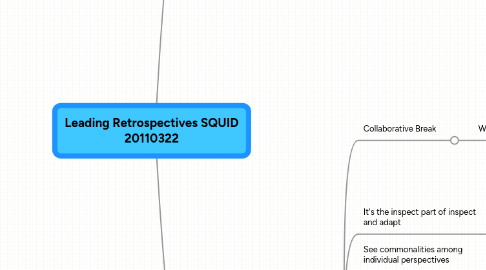
1. What is a retrospective?
1.1. It's a type of mtg
1.1.1. What type of mtg is it?
1.1.1.1. It's a visual mtg
1.1.1.2. It's a collaborative mtg
1.1.1.3. It's a mtg w. a result
1.1.1.4. It's a mtg w. an Agenda
1.1.1.4.1. What the benefit of this?
1.1.1.5. It's a mtg w. clear roles
1.1.1.5.1. What roles?
1.1.1.6. It's a interactive mtg
1.1.1.6.1. Why is this important?
1.1.1.7. It's a particapatory mtg.
1.1.1.8. It's a mtg w. a fuzzy goal
1.1.1.8.1. Why is the goal fuzzy?
1.1.1.9. It's a mtg that is relevant to our life
1.1.1.9.1. How?
1.1.1.10. It's a mtg w. rules
1.1.1.10.1. Why is this important?
1.1.1.10.2. How do we implement it?
1.1.1.11. It's a mtg with a strucutre
1.1.1.11.1. Why is this important?
2. Why do we hold a retrospective?
2.1. Collaborative Break
2.1.1. Why is that needed?
2.1.1.1. Samla sig efter "matchen" sprinten
2.1.1.2. Because there is so much stress in the Sprint
2.1.1.3. För att fira att man gjort ngt bra
2.1.1.4. Innan jag har stängt nåt så tvingas jag lägga energi på det (GTD)
2.2. It's the inspect part of inspect and adapt
2.2.1. What?
2.2.1.1. The Plan, Do, Check, Act thingie
2.3. See commonalities among individual perspectives
2.4. Analyze current situation
2.5. Become inspired and reenergized
2.6. Build & Strengthen group memory
2.7. Explore how past informs future direction
2.8. An essential part of a well working iterative & incremental development process
2.9. För att välja/besluta vad vi ska göra i nästa sprint/iteration
2.10. Awareness
2.10.1. Why is this important?
2.10.1.1. It's the prereq to learning
2.11. TIme for learning
2.12. Visualize history (sprint,release)
2.13. Group learning
2.13.1. Why is this importat?
2.13.1.1. The whole is greater than the sum of the parts
2.13.1.2. Team is more likely to commit to their own solution
2.13.1.3. Team knows why to do certain things
2.14. Insight
2.14.1. How do we generate this?
2.14.1.1. Sök orsaker till symptom
2.15. Understand
2.16. Invented here
2.16.1. Why is this important
2.16.1.1. Team created solutions is more likely to stick
